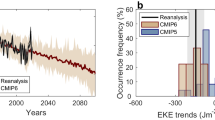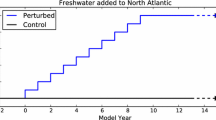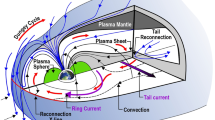Summary
¶On August the 11th, 1999 Central Europe saw a spectacular astronomical event, a total solar eclipse. We present a model study concerning the meteorological effects of this eclipse in central Europe using the state-of-the-art limited area forecast model Deutschland-Modell DM from the German Weather Service DWD. Under typical summer radiation conditions very strong anomalies in the surface energy flux and temperature in screen height are simulated. The main temperature signal in the lower troposphere is delayed by about one hour with respect to the surface. Furthermore it is connected with a well defined dynamical signal which is reminiscent to a large scale land – sea circulation. The event could be used as a test case for mesoscale atmospheric models.
Similar content being viewed by others
Author information
Authors and Affiliations
Additional information
Received February 19, 1999/Revised May 18, 1999
Rights and permissions
About this article
Cite this article
Gross, P., Hense, A. Effects of a Total Solar Eclipse on the Mesoscale Atmospheric Circulation over Europe – A Model Experiment. Meteorol Atmos Phys 71, 229–242 (1999). https://doi.org/10.1007/s007030050057
Issue Date:
DOI: https://doi.org/10.1007/s007030050057




